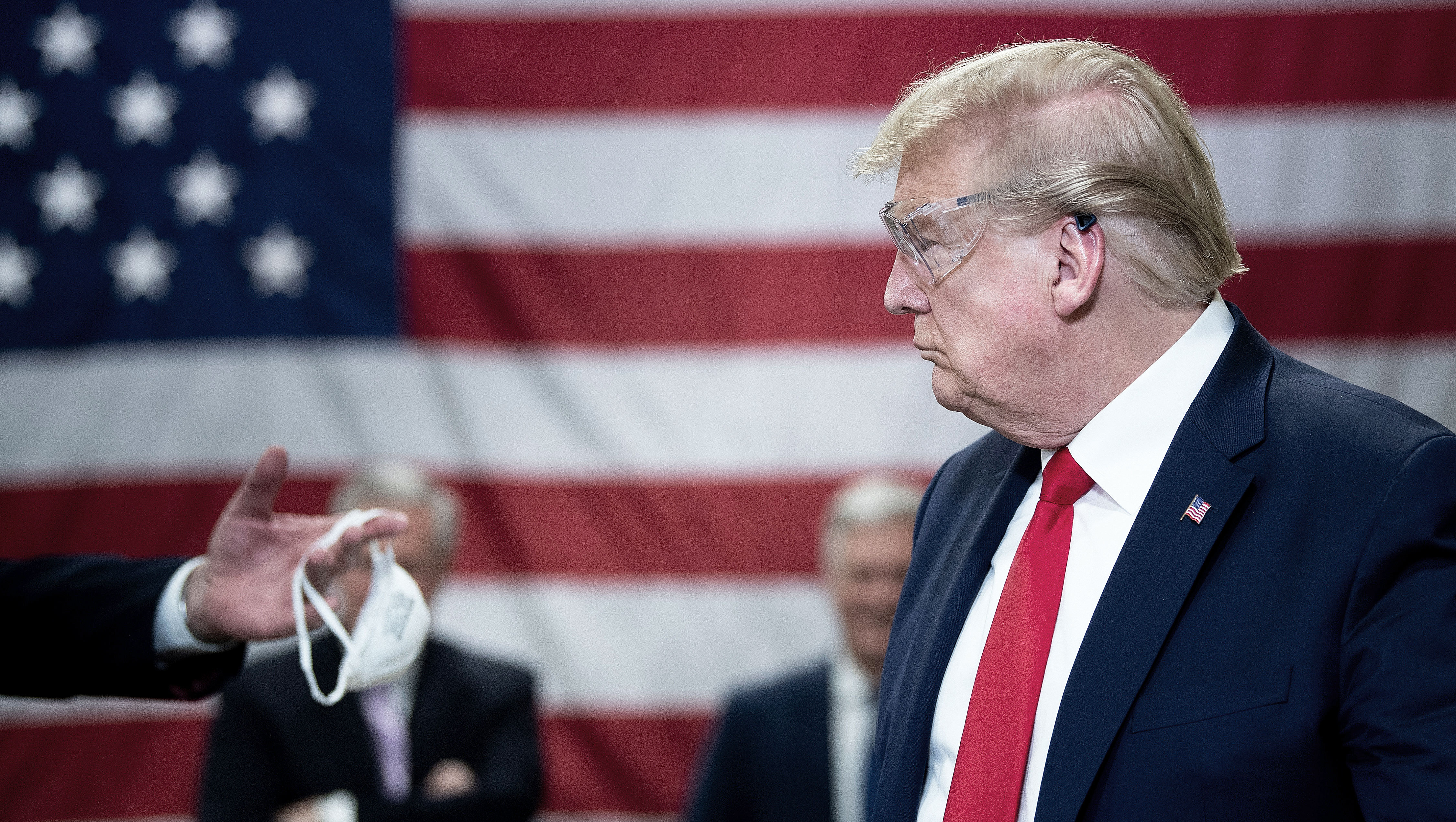Coronavirus: six months of Covid complacency that took the US to two million cases
Donald Trump’s administration reaches grim milestone as outbreak accelerates in some states

A free daily email with the biggest news stories of the day – and the best features from TheWeek.com
You are now subscribed
Your newsletter sign-up was successful
More than two million people have now tested positive for Covid-19 in the US, latest figures show.
The grim milestone passed without comment from Donald Trump, who has barely mentioned the virus in recent days as he focuses instead on the Black Lives Matters protests and his re-election campaign.
“The coronavirus may not be done with the United States, but the nation’s capital seems to be done with the coronavirus,” says The New York Times.
The Week
Escape your echo chamber. Get the facts behind the news, plus analysis from multiple perspectives.

Sign up for The Week's Free Newsletters
From our morning news briefing to a weekly Good News Newsletter, get the best of The Week delivered directly to your inbox.
From our morning news briefing to a weekly Good News Newsletter, get the best of The Week delivered directly to your inbox.
Although new infections - and deaths - are falling in New York and other parts of the country hit hard by Covid-19 in March and April, new hotspots are starting to emerge.
“In some places, like Arizona, intensive care units are nearing capacity,” The Week US reports. The number of Covid-19 patients in hospitals in the state has increased by half since 25 May, following the lifting of lockdown restrictions.
In the past two weeks, daily new infections have trebled in Arizona, doubled in Arkansas and Utah, and risen by more than 50% in North and South Carolina, Florida and Texas.
And a newly published model from the University of Washington suggests that the US is likely to experience a second surge of deaths in the late summer.
A free daily email with the biggest news stories of the day – and the best features from TheWeek.com
“The whole thing turns around at the end of August, and we go from just under 400 deaths a day all the way up to about 1,000 deaths a day by the end of September,” Dr Christopher Murray, director of the university’s Institute for Health Metrics and Evaluation, told CNN.
The new model predicts that the US death toll may reach almost 170,000 by 1 October unless more people wear masks and reduce social interaction.
Yet the past performance of the Trump administration suggests decisive action is unlikely:
January
The first US case of the new coronavirus - not yet named Covid-19 - was reported in Washington State on 21 January. Eight days later, Trump announced the creation of a task force to tackle the outbreak, but then played down the threat at a rally in Iowa just 24 hours later.
“We only have five people,” he said. “Hopefully, everything’s going to be great.”
On 31 January, the president closed the border to non-US citizens who had been to China - then the epicentre of the outbreak - in the two weeks prior to travel. The ban was “neither based on facts, nor helpful”, Chinese officials said.
–––––––––––––––––––––––––––––––For a round-up of the most important stories from around the world - and a concise, refreshing and balanced take on the week’s news agenda - try The Week magazine. Start your trial subscription today –––––––––––––––––––––––––––––––
February
In early February, the US Centers for Disease Control and Prevention (CDC) began to distribute Covid-19 testing kits to labs across the country, but the early tests were contaminated, “handicapping the response”, The Guardian reports.
On 24 February, global markets took fright as concerns grew about the economic cost of the pandemic. On what was the worst day for Wall Street in two years, Trump urged investors to buy. “Stock Market starting to look very good to me!” he tweeted.
Four days later, as the virus took hold in Italy, Trump said Americans had no need to worry. “It’s going to disappear. One day it’s like a miracle, it will disappear,” he told White House reporters.
By the end of the month, the US had recorded its first known coronavirus death.The first confirmed infection with no clear link to foreign travel was also reported - suggesting that Covid-19 was circulating in the community.
March
On 8 March, as the Italian government put Lombardy into lockdown, the US recorded its 500th confirmed case.
The following week, Trump banned incoming travellers from 26 European countries (although initially not the UK), and the baseball and basketball seasons were suspended. Meanwhile, actor Tom Hanks announced that he had tested positive for the virus.
By mid March, the CDC was advising against all gatherings of more than 50 people, but Trump’s messaging grew increasingly mixed. On the 13th, he declared a national emergency, but on the 24th - by which time many state governors had imposed local lockdowns - the president told Fox News that he “would love to have the country opened up and just raring to go by Easter”.
Two days later, the US death toll reached 1,000, before doubling to 2,000 within 48 hours. On 31 March, Trump said the “country is in the midst of a great national trial, unlike any we have ever faced before”.
April
As infection rates continued to climb, Trump took a more interventionist approach, tweeting that he would “call my own shots”, and threatening to overrule state governors who were slow to lift restrictions.
Growing criticism of the US leader then increased further after he suggested that disinfectant or sunlight might cure Covid-19. As the row unfolded, Trump said he was being “sarcastic” when he raised the idea of injecting bleach into coronavirus patients to combat the infection.
Meanwhile, he “also tweeted about the United States ventilator supply, coronavirus testing numbers, and the professional wrestler Triple H”, Politico reports.
The US death toll reached 10,000 on 6 April, and 50,000 on 24 April.
May
Trump’s hostility towards journalists came to a head on 11 May. Having told a Chinese-American reporter that she should direct her question to Beijing instead of him, the president stormed out of the press conference - the last he has held on the subject of Covid-19.
On the same day, with the US death toll at 80,000, Trump tweeted: “Coronavirus numbers are looking MUCH better, going down almost everywhere.”
Five days later, former president Barack Obama intervened. “This pandemic has fully, finally torn back the curtain on the idea that so many of the folks in charge know what they’re doing,” he said in an online message. “A lot of them aren’t even pretending to be in charge.”
By the end of the month, the death toll had topped 100,000.
–––––––––––––––––––––––––––––––For a round-up of the most important stories from around the world - and a concise, refreshing and balanced take on the week’s news agenda - try The Week magazine. Start your trial subscription today –––––––––––––––––––––––––––––––
-
 The Olympic timekeepers keeping the Games on track
The Olympic timekeepers keeping the Games on trackUnder the Radar Swiss watchmaking giant Omega has been at the finish line of every Olympic Games for nearly 100 years
-
 Will increasing tensions with Iran boil over into war?
Will increasing tensions with Iran boil over into war?Today’s Big Question President Donald Trump has recently been threatening the country
-
 Corruption: The spy sheikh and the president
Corruption: The spy sheikh and the presidentFeature Trump is at the center of another scandal
-
 A Nipah virus outbreak in India has brought back Covid-era surveillance
A Nipah virus outbreak in India has brought back Covid-era surveillanceUnder the radar The disease can spread through animals and humans
-
 The stalled fight against HIV
The stalled fight against HIVThe Explainer Scientific advances offer hopes of a cure but ‘devastating’ foreign aid cuts leave countries battling Aids without funds
-
 Obesity drugs: Will Trump’s plan lower costs?
Obesity drugs: Will Trump’s plan lower costs?Feature Even $149 a month, the advertised price for a starting dose of a still-in-development GLP-1 pill on TrumpRx, will be too big a burden for the many Americans ‘struggling to afford groceries’
-
 Covid-19 mRNA vaccines could help fight cancer
Covid-19 mRNA vaccines could help fight cancerUnder the radar They boost the immune system
-
 Can TrumpRx really lower drug prices?
Can TrumpRx really lower drug prices?Today’s Big Question Pfizer’s deal with Trump sent drugmaker stocks higher
-
 The new Stratus Covid strain – and why it’s on the rise
The new Stratus Covid strain – and why it’s on the riseThe Explainer ‘No evidence’ new variant is more dangerous or that vaccines won’t work against it, say UK health experts
-
 Why are autism rates increasing?
Why are autism rates increasing?The Explainer Medical experts condemn Trump administration’s claim that paracetamol during pregnancy is linked to rising rates of neurodevelopmental disorder in US and UK
-
 RFK Jr. vaccine panel advises restricting MMRV shot
RFK Jr. vaccine panel advises restricting MMRV shotSpeed Read The committee voted to restrict access to a childhood vaccine against chickenpox